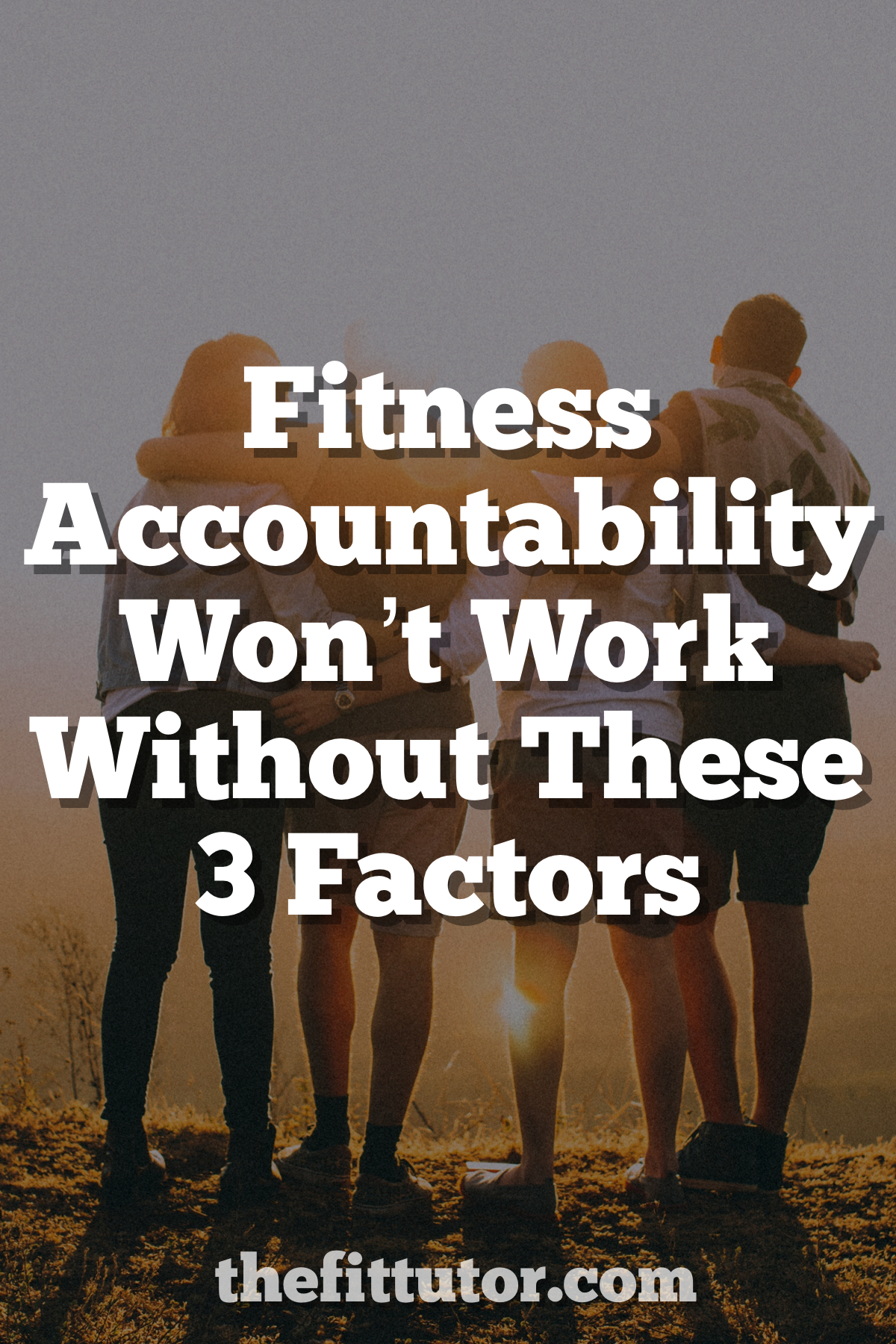While some people are graced with determination and motivation, others of us know we will not accomplish any health or fitness goal without a watchdog. Although most of us are looking for someone to drive us to the gym or walk around behind us and slap unhealthy food out of our hands, we usually settle for a fitness accountability partner to check in with.
Should You Get a Fitness Accountability Partner?
A fitness accountability partner is awesome for keeping you on track to reach your goals! I’d say it’s a must for anyone who struggles with consistency or discipline. If you find that you have goals, but you aren’t prioritizing what you need to achieve them, or the only thing you’re consistent with is quitting, then I’d recommend one!
However, just enlisting someone to check in on you or nag you to log miles on the treadmill doesn’t always work. I’ve seen fitness accountability crash and burn many a times, and I’d love to share the secrets of a successful relationship based on years of keeping women accountable to their health and fitness goals!
Fitness Accountability Won’t Work Without These 3 Factors
Have a Specific Game Plan
Don’t just ask someone to help you workout more and check in with you every now and again. For many of you, that’s not going to get you off the couch or to step away from the donuts.
Specific Goals
Be specific with your goals. What do you want to accomplish? What will you do to get there? Instead of saying “I want to start exercising” determine how many times per week you will workout. Instead of saying you want to lose 10 pounds, be specific on what healthy eating habits you want to create, like meal planning, cooking 4 times per week, or eating 5 servings of vegetables per day for example.
Specifics on Accountability
Now that you’ve set some specific goals, be specific on your accountability check-ins. How often will these be? Daily? Once a week? Who initiates them? What happens if you don’t meet your goals? What happens if you do? More on these last two questions in a moment.
Have a Backup Plan in Place
Although thinking about getting fit in the first place can seem daunting, it’s helpful to brainstorm a backup plan if possible. What do you do when life gets crazy? When you have a sick kid, or if you stayed home sick from work? What about if you travel for work, or you have three birthday dinners this week?
It seems across the board it’s hard for people to re-start something once they had a break. So if you throw in the towel during a crazy week, it may be harder to bounce back than if you just had a game plan of modified goals and habits!

Establish Rewards and/or Consequences
For some people, having someone to check in with is enough, and for others, just feeling better about themselves is all they need to keep going. But if you know that won’t work for you, or if you try a few weeks and it’s just not enough, set up rewards for meeting your goals and consider consequences for missing them.
Naturally
Natural rewards and consequences work for some people, like fitting into their swimsuit for vacation or overall lacking energy. I’ve found that for many, motivation is fleeting, and people need short-term consequences incorporated into their accountability.
Personal Rewards
Find something that you really want, like a new workout top, a massage, or your feet up while reading a book. For every week or two that you meet your goals, you’re able to treat yourself to the reward of your choice. Some people like to put money away towards a goal each week they succeed, like for an expensive pair of running shoes or a spa day. Think about what motivates you and how often you’d need to be rewarded to keep you consistent.
Consequences for Missing Goals
Consequences for skipping healthy habits can be tricky. If you’ve had an eating disorder or a notoriously unhealthy relationship with food or your body, this is not the way to go, and you should talk with your counselor or doctor before starting any accountability or weight loss program.
If you think setting consequences would work for you, you’ll want to find something that, when you think about it, would make you go to the gym or pull out of the drive thru. The consequence is harsh enough it makes you stick to your goals, but not something that’s awful or impossible or makes you quit altogether. You can play around with this as you go, too.
And avoid anything that involves shame or public humiliation, and keep it within your budget.
Consequences get a bad rap, but I think they’re perfect for some people. If you don’t pay your electricity bill the consequence is having your lights turned off. I think taking care of your body is just as important as any other task we deem necessary- even more so! I’ve found that natural consequences turn up as diseases or huge health problems later. Setting up your own consequences now for something you know you should be doing but don’t feel like doing can add years to your life and save you tons of money in the long run.
Examples
What are some ideas? How about a week sans social media if you miss your healthy eating goals? Or if your closet looks like you’re a fitness buff but you never go to the gym, no shopping next week (or month- gasp!) if you don’t meet your workout goal. Find something that works for your life and your personality.
You could always think of it like you’re “earning” social media or shopping access the following week by exercising, like your son earns his screen time by cleaning up his room! We’re just grown kids with more responsibilities, anyway!
Let Your Accountability Partner In
If you don’t let your accountability partner in, give them a little power, and determine to keep your relationship honest, you won’t get very far.
I have many clients who pay me for accountability, but they never want to hand over any power. They want to achieve these goals, but they don’t want there to be any cost if they don’t. I can’t blame them! Habit change is tough! I’ve found that, depending on personality, people who give me some sort of power in accountability see more results- and faster!
Give Their Opinions Weight
I think choosing your own goals is important- you know what’s doable in your schedule. Choosing your own accountability is important — you know what will motivate you. But allowing your partner to have a say is also good. Give them permission to mention if your goals seem impossible and are setting you up for failure, or if your consequence is something that they know won’t actually deter you from a late night ice cream binge.
Give Them Some Power
Although it may seem scary, it’s important to give them permission to “enforce” consequences, and send them pictures when you’re reaping a reward! I have clients who send me financial fines for missing their goals, who send me screenshots of their inactive instagram account, or will actually write me essays about why they slacked off. Whenever we set a consequence, I ask how will they show me that they’re sticking to it. On the flip side, I get photos of their new (size smaller!) jeans, texts about how great their massage was, and messages about how their confidence has increased!
Human nature is a wonderful, awful, and funny thing. Letting your accountability partner in will help you finally help you move past yourself and into the person you want to become. This is truly being held accountable.
Just Say No to Ghosting
This one is tough. No one can stop you from just disappearing completely and ignoring your fitness accountability partner. This is where you need some GRIT or resolve to keep showing up. Face the consequences, have some hard talks if needed, roll your eyes repeatedly, but keep showing up. I’ll say it again:
Keep
Showing
Up.
You can set a rule where if one accountability partner doesn’t respond within 48 hours, they are sent a $15 request from the Cash App. Or they pay next time you all go to dinner. Or send money to charity. Decide this between the two of you.
Who To Choose for Your Fitness Accountability Partner
You want someone you trust, who is honest and tough, and who is reliable and fair. Someone you won’t lie to, someone you don’t want to disappoint, and someone you know will call you out and be real with you. Someone who will celebrate success with you and cheer you on as you go.
That being said, this is a lot to ask of a friend or loved one. A lot. So choose someone whom this won’t put a strain on your friendship or create conflict or tension. If you’re going to the gym, it can be helpful to choose someone who has the same schedule as you and will be a workout buddy.
How Hiring a Pro Could Save Your Friendship
Honestly, I’ve seen a lot of relationships strained and stressed over getting into something so personal and deep.
I used to encourage people to find a friend, but not anymore. Hiring someone means you’re immediately invested: it’s costing you something. And, it means that this is the purpose of your relationship. This way you won’t have to run into your friend at Sunday brunch who’s been avoiding your texts about working out.
Trust me on this.
Plus, if you hire a fit coach, you should be getting top notch fitness and nutrition advice anyway, which should help you in your journey! Win-win.
I’ve found that people who hire someone achieve better and faster results than those who do not. Not convinced? Good news: these tips I’ve given will help any accountability partners be more successful, but if you haven’t tried a pro yet, I’d love to help you reach your goals!
Personalized accountability could be a game changer for you. If you’re tired of starting and stopping the things you want to do, check out my plans or shoot me an email!



Comments are closed.